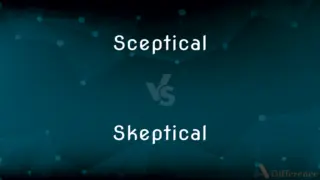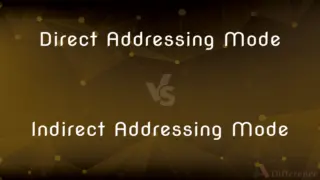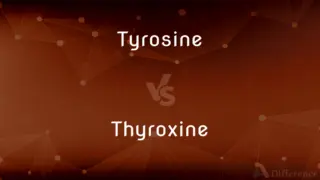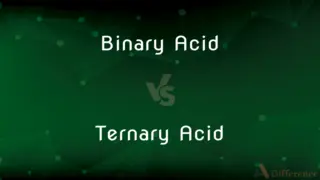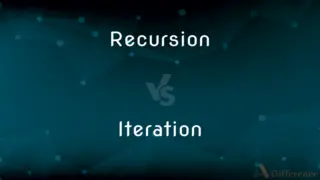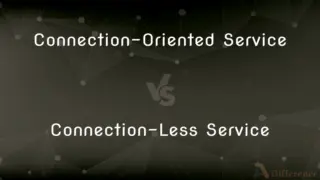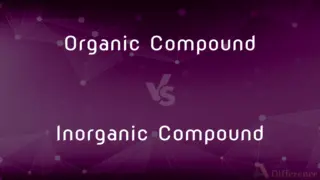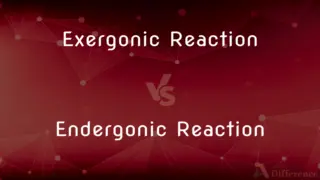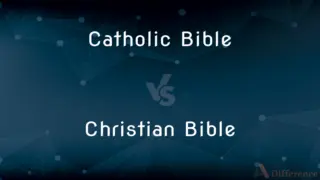Powerless vs. Powerful — What's the Difference?
Edited by Tayyaba Rehman — By Fiza Rafique — Updated on April 5, 2024
Powerless refers to lacking the ability, strength, or authority to act or influence, while powerful signifies having great power, strength, or influence.

Difference Between Powerless and Powerful
Table of Contents
ADVERTISEMENT
Key Differences
Powerless is a condition or feeling of having no control, ability, or influence over events or people's actions. It often relates to situations where individuals or entities find themselves unable to effect change or assert their will. On the other hand, powerful describes individuals, groups, or entities that possess significant strength, authority, or influence, enabling them to direct outcomes, make impactful decisions, and command respect or fear.
While powerless individuals might struggle to have their voices heard or to impact their surroundings, powerful ones can shape environments, policies, and lives, often with just a few words or actions. This contrast not only highlights the disparities in societal, political, or personal dynamics but also underscores the impact of power (or the lack thereof) on one's ability to navigate and influence their world.
In societal contexts, being powerless can result from socio-economic conditions, discrimination, or systemic barriers, limiting individuals' opportunities and access to resources. Meanwhile, powerful entities, such as governments, organizations, or influential individuals, often have the means to shape societal norms, allocate resources, and influence legislative or policy outcomes, thereby reinforcing their positions of power and sometimes exacerbating inequalities.
On a personal level, feeling powerless can significantly affect one's mental and emotional well-being, leading to feelings of frustration, hopelessness, or resignation. In contrast, wielding power can instill a sense of responsibility, confidence, or, in some cases, arrogance and detachment from the realities faced by less powerful individuals.
The dynamics between the powerless and the powerful are complex and can change over time. Movements and collective action can shift power balances, turning previously powerless groups into powerful agents of change. Conversely, powerful individuals or entities can find themselves powerless in the face of global events, technological shifts, or societal changes that render their traditional sources of power less effective or irrelevant.
ADVERTISEMENT
Comparison Chart
Definition
Lacking the ability, strength, or authority to act
Possessing great power, strength, or influence
Influence on Others
Minimal to none, struggles to effect change
Significant, can direct outcomes and decisions
Societal Impact
Often marginalized, with limited opportunities
Can shape societal norms and policies
Emotional Impact
Can lead to frustration, hopelessness
Can instill confidence, responsibility
Potential for Change
Can become powerful through collective action
Can become powerless due to shifts in dynamics
Compare with Definitions
Powerless
Devoid of energy or capability.
After the storm, the entire city was powerless.
Powerful
Wealthy, influential in society or industry.
The company has become a powerful player in the tech world.
Powerless
Without legal or official power.
The committee was powerless to enforce any real changes.
Powerful
Capable of exerting force or influence.
The documentary made a powerful impact on public opinion.
Powerless
Lacking authority or strength.
The small nation was powerless against the economic sanctions.
Powerful
Strong and effective in action or effect.
She delivered a powerful speech that moved everyone.
Powerless
Incapable of acting due to constraints.
Trapped in bureaucracy, he felt completely powerless.
Powerful
Having great power or influence.
A powerful leader can inspire an entire nation.
Powerless
Unable to influence or change a situation.
Feeling powerless, she could only watch as decisions were made without her input.
Powerful
Physically strong or potent.
The medication is quite powerful and must be taken carefully.
Powerless
Lacking strength or power; helpless and totally ineffectual.
Powerful
Having or capable of exerting power.
Powerless
Lacking legal or other authority.
Powerful
Effective or potent
A powerful drug.
Powerless
Lacking sufficient power or strength.
I admit that I am powerless over my hatred towards white people in ways that I am unable to recognize fully, both at this time and in the past.
Powerful
Chiefly Upper Southern US Great
"[Everybody had] a powerful lot to say about faith and good works and free grace ... and I don't know what all" (Mark Twain).
Powerless
Lacking legal authority.
The traffic warden was powerless to stop me driving away.
Powerful
Very
It was powerful humid.
Powerless
Destitute of power, force, or energy; weak; impotent; not able to produce any effect.
Powerful
Having, or capable of exerting power, potency or influence.
Powerless
Lacking power
Powerful
Leading to many or important deductions.
A powerful set of postulates
A powerful theorem
Powerful
(mining) Large; capacious; said of veins of ore.
Powerful
(Southern US) very
Powerful
Full of power; capable of producing great effects of any kind; potent; mighty; efficacious; intense; as, a powerful man or beast; a powerful engine; a powerful argument; a powerful light; a powerful vessel.
The powerful grace that liesIn herbs, plants, stones, and their true qualities.
Powerful
Large; capacious; - said of veins of ore.
Powerful
Having great power or force or potency or effect;
The most powerful government in western Europe
His powerful arms
A powerful bomb
The horse's powerful kick
Powerful drugs
A powerful argument
Powerful
Strong enough to knock down or overwhelm;
A knock-down blow
Powerful
Having the power to influence or convince;
A cogent analysis of the problem
Potent arguments
Powerful
(of a person) possessing physical strength and weight; rugged and powerful;
A hefty athlete
A muscular boxer
Powerful arms
Powerful
Displaying superhuman strength or power;
Herculean exertions
Powerful
(Southern regional intensive) very;
The baby is mighty cute
He's mighty tired
It is powerful humid
That boy is powerful big now
They have a right nice place
Common Curiosities
How can someone overcome feeling powerless?
Overcoming feelings of powerlessness often involves collective action, seeking support, empowering oneself through knowledge, and finding areas where one can exert influence.
What are the characteristics of a powerful person?
A powerful person typically has significant influence, authority, or strength, which they can use to effect change or direct outcomes.
What does it mean to be powerless?
Being powerless means lacking the ability, authority, or strength to influence situations, decisions, or outcomes.
Can power dynamics change?
Yes, power dynamics can change due to various factors, including social movements, economic shifts, and changes in public opinion or technology.
Is power always positive?
Power is neutral; its impact depends on how it is used. It can lead to positive changes and progress or be abused, causing harm and inequality.
Can organizations be powerful?
Yes, organizations can be powerful, especially if they have significant influence over markets, policies, or societal norms.
How does being powerful affect an individual’s behavior?
Being powerful can affect individuals differently, instilling a sense of responsibility in some, while leading to arrogance or detachment in others.
What are the dangers of unchecked power?
Unchecked power can lead to abuses, corruption, and the marginalization of less powerful individuals or groups, highlighting the importance of accountability mechanisms.
What role does power play in leadership?
In leadership, power is crucial for decision-making, influencing others, and driving initiatives; effective leaders balance power with empathy and responsibility.
Can power be shared?
Power can be shared in environments that prioritize collaboration, equity, and distributed decision-making, fostering more inclusive and balanced dynamics.
What makes a statement powerful?
A statement can be powerful if it resonates deeply, inspires change, or effectively conveys a significant message.
What is the relationship between power and social status?
Power often correlates with social status, as those with higher status typically have more resources, influence, and authority.
Is it possible for powerful people to feel powerless?
Yes, powerful individuals can feel powerless in situations where their usual sources of influence are ineffective or irrelevant.
How does culture influence perceptions of power?
Cultural norms and values significantly influence how power is perceived, valued, and exercised, shaping societal expectations and behaviors regarding authority and influence.
How do powerless people gain power?
Powerless individuals or groups can gain power through organizing, advocating for change, building alliances, and leveraging social or media platforms to amplify their voices.
Share Your Discovery

Previous Comparison
Complete vs. Full
Next Comparison
Understand vs. AcknowledgeAuthor Spotlight
Written by
Fiza RafiqueFiza Rafique is a skilled content writer at AskDifference.com, where she meticulously refines and enhances written pieces. Drawing from her vast editorial expertise, Fiza ensures clarity, accuracy, and precision in every article. Passionate about language, she continually seeks to elevate the quality of content for readers worldwide.
Edited by
Tayyaba RehmanTayyaba Rehman is a distinguished writer, currently serving as a primary contributor to askdifference.com. As a researcher in semantics and etymology, Tayyaba's passion for the complexity of languages and their distinctions has found a perfect home on the platform. Tayyaba delves into the intricacies of language, distinguishing between commonly confused words and phrases, thereby providing clarity for readers worldwide.





